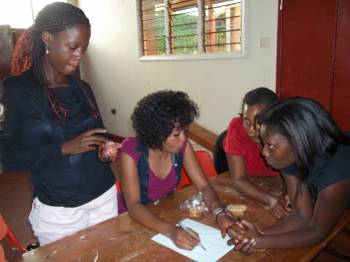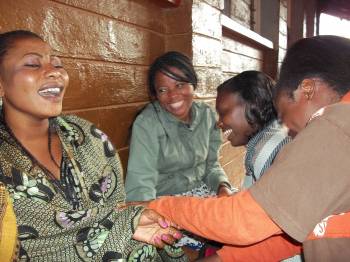The first issue of the comic ElfQuest, written in 1978, depicts a kidnapped elf called Redlance. Elves can "send" thoughts telepathically to other elves within "sending range." The captured Redlance is saved because his loved ones "send" to one another, collaborating to ambush and free him -- without the knowledge of his captors.
In late November 2011, over 30 years afterElfquest was written, Egyptian-American columnist Mona Eltahawy sent a tweet from Cairo reading simply: "Beaten arrested in interior ministry."
Mere hours after that, former State Department Policy Planning Director Anne-Marie Slaughter was alerted by scholars, journalists, and friends of Eltahawy who saw the tweet and replied. Slaughter's tweet to Mona began: "We hear you." #FreeMona had by then trended worldwide on Twitter, and within a few more hours, Mona was free. Abused, traumatized, and injured, but free.
We hear you. The phrase echoed in my head; I thought of Beckett's Waiting For Godot. "'Tell him...' (he hesitates) '...tell him you saw me and that...' (he hesitates) '...that you saw me,'" says Vladimir to the Boy as Vladimir waits for the "him" that he wishes to be seen by. Vladimir's self, literary critics have argued, has yet to be constructed; he needs the validation of being seen to truly exist.
Here in Nairobi, author and editor Billy Kahora calls it "the end of structure": from the Arab Spring, to the Occupy movement, to the gaggle of high-security-system Internet hackers called Anonymous, groups of people whose identity politics defy preexisting cultural and sometimes national borders -- and, perhaps most mind-bendingly, who don't even necessarily share a specific goal -- are changing the world, rendering previous structures of government and containment practically obsolete. The game has relatedly been changed by what social media has done for freedom of speech and rapid-network activism, and it's not just mammoth governmental and international institutions that need to catch up. It's each of us; it's how we conceive of the individual, and how we define "society."
Slaughter herself has pointed out in an Atlantic piece that both the Arab Spring and Occupy are rooted in a "deep sense of injustice and invisibility." In other words, perhaps, these protests are evidence of civilians' not feeling seen or heard by those in power; governments ideally exist to protect and care for civilians who certainly can't be cared for if they're not seen or heard. (On the other hand, of course, we have Anonymous members who thrive on the not-being-seen opportunities currently afforded them by the very same engines that give people like Eltahawy a singular and "visible" voice.) Slaughter works tirelessly to include over Twitter those civilians previously without access to the foreign policy conversation, a public discourse that she has helped steer toward the concept of "collaborative power," a kind of power that, she writes in another piece, "is not held by any one person or in any one place."
When I came to Nairobi to create an arts workshop with young refugees, the political lens was not the one through which I primarily saw my project. Nor had I used it much when I tutored adolescent Korean immigrants in the suburbs of Seattle, or when I taught creative writing to undergraduate Hoosiers in Indiana. It wasn't until I mobilized a theater group for Congolese refugee girls who call themselves The Survival Girls, survivors of gang rape at the hands of rebel army soldiers who murdered their parents in front of them, that I truly learned what the self-expression that is youth empowerment in Kenya means to the future of democracy.
Today in the slum of Kangemi, to begin discussion for the Survival Girls' next theater piece -- which they will, as always, create as a group -- I gave my girls notepaper and asked them each to draw/write about their ideal future.
Several of the girls fled individually on foot from Congo to Burundi, curled up for three days in the back of a truck through Uganda and Rwanda, holding their breath in their hiding place at the borders on their way into Kenya. Some of them (their photos not shown here) are still hunted by Congolese rebels sent to Nairobi to finish the job of killing off the families of the supposed traitors to their cause (usually the girls' murdered fathers). Those who have not seen their mothers raped to death still don't know where their mothers are.
 Survival Girls in workshop
Survival Girls in workshop
The girls' ideal futures could've been anything -- I told them nothing was off limits. I didn't rule out big houses, cars, snazzy phones, a handsome husband, maybe a life in Europe or America; I've met refugees who dream of those things, and I don't fault them for it.
Five out of six girls today drew pictures of community centers.
More than anything, these girls want to heal their communities. And given both safe space to recover from their ordeals and the education they need, they'll do it -- and the more I observe development work, the more convinced I am that they're the only ones who can. The very word "community" implies collaboration. And the face of trauma so great these girls could understandably have given up on life completely, they showed me a new kind of activism, a revolution no less powerful than the one in Egypt, when they chose to push against the overwhelming depressants of traumatic memories not just to exist in the present, but to move in it physically, joyfully, and with hope.
 Survival Girls, after being kicked out of their practice room by an all-male singing group, make the best of it
Survival Girls, after being kicked out of their practice room by an all-male singing group, make the best of it
The girls are going to need that for what lies ahead. I've spent the last few weeks in Nairobi asking international development experts and taxi cab drivers alike about terrorist group Al'Shabaab and next year's potential for a repeat of Kenya's '07-'08 election violence. Responses couldn't be more varied. Some assert there won't be violence next year. Some say Al'Shabaab has no central base and "you can't just go into Somalia and capture the source, like bin Laden." The broad swath of Kenyan no-man's-land east of Garrisa near the Somalia-Kenya border is a lawless place where "the guy who kidnaps you is not the guy who keeps you is not the guy who paid for your kidnapping, and none of them really know each other," opined one friend. "You call them all Al'Shabaab, but if you go there, it's just destitute people hiding with their goats. It's less driven by unifying principles and more by a very loose affiliation of crooks doing discrete jobs for money." One expert connected this with the potential for worse election violence next year than in '07, what with thousands of Kenyan soldiers sent to attack Al'Shabaab in Somalia this fall reportedly defecting -- only to be hired by Kenyan politicians to rid their counties of opposition constituencies, which divisions in Kenya run along tribal lines. This rumor doesn't bode well for next year, and it doesn't bode well for my girls, who remember all too well election violence taking the form of non-Kenyan populations receiving the brunt of murderous anger in poor areas.
If there is not no structure, but a new kind of structure, to the Arab Spring and Occupy, and if there is an effective structure to the way society can respond to that change, we won't find it in the domestic and foreign policies of enforcement and isolation that worked (or didn't) for our grandparents' generation. We may instead find it in policies that work from the bottom up by honoring the individual's capacity for contribution to the collaborative whole, from my girls in Nairobi to the online community that Slaughter, in a bid to respond constructively to foreign policy's changing landscape, has invited to be part of the conversation. Mona Eltahawy, in her hour of need, was heard and seen. In large-scale responses to recent upheaval, we might choose to focus on ways to hear and see formerly invisible populations, and reclaim this century for what it has the potential to be: an age of collaboration, wherein dreams that used to take place only in comic books or on notepaper come to life in the name of borderless care for one another.All photos are the author's own; the Survival Girls have given permission for their stories and photos to be shared.